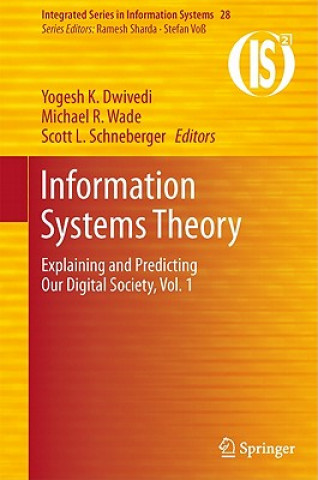
Code: 01423905
Information Systems Theory
by Yogesh K. Dwivedi, Michael R. Wade, Scott L. Schneberger
The overall mission of this book is to provide a comprehensive understanding and coverage of the various theories and models used in IS research. Specifically, it aims to focus on the following key objectives: §To describe the var ... more
- Language:
 English
English - Binding: Hardback
- Number of pages: 502
Publisher: Springer-Verlag New York Inc., 2011
- More about this

273.12 €

Low in stock at our supplier
Shipping in 13 - 16 days
Potřebujete více kusů?Máte-li zájem o více kusů, prověřte, prosím, nejprve dostupnost titulu na naši zákaznické podpoře.
Add to wishlist
You might also like
-

Láska
11.39 € -12 % -

Ahoj, hádanka!
6.95 € -36 % -

The Storm
18.25 € -

Russian Decorative Arts
105.63 € -

Memories of Envy
8.06 € -13 % -

BON Praha - rusky
8.36 € -14 % -

Tenjo Tenge (Full Contact Edition 2-in-1), Vol. 11
12.40 € -18 % -

Der Traum
14.72 € -14 % -

Palookaville
18.15 € -21 % -

Fernerkundung in Kustengebieten
36.41 € -2 % -

Psychologische Aspekte in der Traditionellen Chinesischen Medizin
24.61 € -14 % -

Zur Problematik der Veranstalterhaftung bei Events
42.57 € -1 % -

Coastal Zone Management Imperative for Maritime Developing Nations
273.12 € -

Life Cycles
136.71 € -

Cartulaires Francais en Angleterre
39.74 € -

Resurrection of Ireland
124.09 € -

Stone Collector Book 1
16.03 € -4 % -

Computational Intelligence in Bioinformatics
185.14 € -

Advances in Databases
78.99 € -

Fundamental Approaches to Software Engineering
61.44 € -

Himmelreich
13.91 € -5 % -

Impact of Federal Investment on Hydrogen and Fuel Cell Technologies
34.50 € -

Weltgeschichte von der Vorzeit bis heute
26.12 € -14 % -

Swift's Parody
128.33 € -

Der Wandel weltwirtschaftlicher Institutionen.
64.87 € -4 % -

Miles McHale, Tattletale
15.83 € -21 % -

Ibsen als Norweger und Europäer
40.65 € -1 % -

Hermeneutische Theologie - heute?
117.94 € -

History of Afro-Hispanic Language
149.52 € -

Hamlet
24.41 € -2 % -

Desolation and Enlightenment
125.10 € -

Posttraumatische Belastungsstörung, m. CD-ROM
37.62 € -4 % -

Naturwissenschaftliche Einfuhrung in Die Bakteriologie
73.14 € -6 % -

Die Sonate
23.20 € -9 % -

Pious Seductress
189.58 €
Give this book as a present today
- Order book and choose Gift Order.
- We will send you book gift voucher at once. You can give it out to anyone.
- Book will be send to donee, nothing more to care about.
More about Information Systems Theory
You get 685 loyalty points
 Book synopsis
Book synopsis
The overall mission of this book is to provide a comprehensive understanding and coverage of the various theories and models used in IS research. Specifically, it aims to focus on the following key objectives: §To describe the various theories and models applicable to studying IS/IT management issues. To outline and describe, for each of the various theories and models, independent and dependent constructs, reference discipline/originating area, originating author(s), seminal articles, level of analysis (i.e. firm, individual, industry) and links with other theories. To provide a critical review/meta-analysis of IS/IT management articles that have used a particular theory/model.To discuss how a theory can be used to better understand how information systems can be effectively deployed in today s digital world. This book contributes to our understanding of a number of theories and models. The theoretical contribution of this book is that it analyzes and synthesizes the relevant literature in order to enhance knowledge of IS theories and models from various perspectives. To cater to the information needs of a diverse spectrum of readers, this book is structured into two volumes, with each volume further broken down into two sections. §The first section of Volume 1 presents detailed descriptions of a set of theories centered around the IS lifecycle, including the Success Model, Technology Acceptance Model, User Resistance Theories, and four others. The second section of Volume 1 contains strategic and economic theories, including a Resource-Based View, Theory of Slack Resources, Portfolio Theory, Discrepancy Theory Models, and eleven others. §The first section of Volume 2 concerns socio-psychological theories. These include Personal Construct Theory, Psychological Ownership, Transactive Memory, Language-Action Approach, and nine others. The second section of Volume 2 deals with methodological theories, including Critical Realism, Grounded Theory, Narrative Inquiry, Work System Method, and four others.§Together, these theories provide a rich tapestry of knowledge around the use of theory in IS research. Since most of these theories are from contributing disciplines, they provide a window into the world of external thought leadership.The overall mission of this book is to provide a comprehensive understanding and coverage of the various theories and models used in IS research. Specifically, it aims to focus on the following key objectives: §To describe the various theories and models applicable to studying IS/IT management issues. To outline and describe, for each of the various theories and models, independent and dependent constructs, reference discipline/originating area, originating author(s), seminal articles, level of analysis (i.e. firm, individual, industry) and links with other theories. To provide a critical review/meta-analysis of IS/IT management articles that have used a particular theory/model.To discuss how a theory can be used to better understand how information systems can be effectively deployed in today s digital world. This book contributes to our understanding of a number of theories and models. The theoretical contribution of this book is that it analyzes and synthesizes the relevant literature in order to enhance knowledge of IS theories and models from various perspectives. To cater to the information needs of a diverse spectrum of readers, this book is structured into two volumes, with each volume further broken down into two sections. §The first section of Volume 1 presents detailed descriptions of a set of theories centered around the IS lifecycle, including the Success Model, Technology Acceptance Model, User Resistance Theories, and four others. The second section of Volume 1 contains strategic and economic theories, including a Resource-Based View, Theory of Slack Resources, Portfolio Theory, Discrepancy Theory Models, and eleven others. §The first section of Volume 2 concerns socio-psychological theories. These include Personal Construct Theory, Psychological Ownership, Transactive Memory, Language-Action Approach, and nine others. The second section of Volume 2 deals with methodological theories, including Critical Realism, Grounded Theory, Narrative Inquiry, Work System Method, and four others.§Together, these theories provide a rich tapestry of knowledge around the use of theory in IS research. Since most of these theories are from contributing disciplines, they provide a window into the world of external thought leadership.The overall mission of this book is to provide a comprehensive understanding and coverage of the various theories and models used in IS research. Specifically, it aims to focus on the following key objectives: §To describe the various theories and models applicable to studying IS/IT management issues. To outline and describe, for each of the various theories and models, independent and dependent constructs, reference discipline/originating area, originating author(s), seminal articles, level of analysis (i.e. firm, individual, industry) and links with other theories. To provide a critical review/meta-analysis of IS/IT management articles that have used a particular theory/model.To discuss how a theory can be used to better understand how information systems can be effectively deployed in today s digital world. This book contributes to our understanding of a number of theories and models. The theoretical contribution of this book is that it analyzes and synthesizes the relevant literature in order to enhance knowledge of IS theories and models from various perspectives. To cater to the information needs of a diverse spectrum of readers, this book is structured into two volumes, with each volume further broken down into two sections. §The first section of Volume 1 presents detailed descriptions of a set of theories centered around the IS lifecycle, including the Success Model, Technology Acceptance Model, User Resistance Theories, and four others. The second section of Volume 1 contains strategic and economic theories, including a Resource-Based View, Theory of Slack Resources, Portfolio Theory, Discrepancy Theory Models, and eleven others. §The first section of Volume 2 concerns socio-psychological theories. These include Personal Construct Theory, Psychological Ownership, Transactive Memory, Language-Action Approach, and nine others. The second section of Volume 2 deals with methodological theories, including Critical Realism, Grounded Theory, Narrative Inquiry, Work System Method, and four others.§Together, these theories provide a rich tapestry of knowledge around the use of theory in IS research. Since most of these theories are from contributing disciplines, they provide a window into the world of external thought leadership.
 Book details
Book details
Book category Books in English Economics, finance, business & management Business & management Business mathematics & systems
273.12 €
- Full title: Information Systems Theory
- Subtitle: Explaining and Predicting Our Digital Society, Vol. 1
- Author: Yogesh K. Dwivedi, Michael R. Wade, Scott L. Schneberger
- Language:
 English
English - Binding: Hardback
- Number of pages: 502
- EAN: 9781441961075
- ISBN: 1441961070
- ID: 01423905
- Publisher: Springer-Verlag New York Inc.
- Weight: 898 g
- Dimensions: 240 × 160 × 36 mm
- Date of publishing: 20. September 2011
Trending among others
-

The Phoenix Project
21.99 € -11 % -

Study Guide for Technical Analysis Explained
31.27 € -20 % -

Schaum's Outline of Business Statistics, Fourth Edition
27.03 € -14 % -

Beginning DAX with Power BI
46.20 € -28 % -

Technical Analysis Explained, Fifth Edition: The Successful Investor's Guide to Spotting Investment Trends and Turning Points
80.91 € -

Business Math For Dummies
18.25 € -29 % -

Art of the Steal
16.64 € -21 % -

Mastering Microsoft Power BI
61.64 € -

Fundamentals of Business Process Management
63.35 € -17 % -

Study Guide for Technical Analysis Explained Fifth Edition
55.08 € -28 % -

Production-Ready Microservices
32.18 € -28 % -

SAP S/4HANA Conversion
47.31 € -

Business Intelligence: A Managerial Approach, Global Edition
89.28 € -

Beginning Apache Spark Using Azure Databricks
46.91 € -

Azure Automation Using the ARM Model
27.33 € -18 % -

Information Systems Today: Managing the Digital World, Global Edition
73.64 € -2 % -

Truth Machine
17.65 € -22 % -

Business Statistics For Dummies
25.42 € -4 % -

Digital Influence
38.13 € -3 % -

Deploying SharePoint 2016
99.37 € -

Marketing Data Science
74.65 € -10 % -

Basic Business Statistics, Global Edition
106.84 € -

Enterprise Architecture at Work
110.27 € -

Digitalization in Healthcare
72.23 € -

Management by Business Process
121.07 € -

Getting Started with Grafana
66.78 € -

Digitalization
72.23 € -

Essentials of Licensing Intellectual Property
38.73 € -

Pro SAP Scripts, Smartforms, and Data Migration
77.68 € -

Economist Numbers Guide 6th Edition
17.44 € -18 % -

Intelligent Methods and Big Data in Industrial Applications
186.25 € -

Handbook on Decision Support Systems 2
240.53 € -

Explorations With Texas Instruments TI-85
89.49 € -

AI in Marketing, Sales and Service
56.69 € -

Process Mining Handbook
47.51 € -3 % -

Social Commerce
106.44 € -4 % -

Building an Enterprise Architecture Practice
142.86 € -

Building Decentralized Trust
153.66 € -

Unleashing the Power of IT, Second Edition - Bringing People, Business, and Technology Together
40.75 € -19 % -

Managing IT Projects
48.72 € -18 % -

Machine Learning in Finance
128.73 € -7 % -

Statistics for Business and Economics, Global Edition
98.36 € -

Dark Web
186.25 € -

Ackoff's Best
52.66 € -18 % -

Business Process Management
93.93 € -

Practical Web Scraping for Data Science
64.56 € -18 % -

Cybersecurity
197.04 € -

Deep Belief Nets in C++ and CUDA C: Volume 1
31.27 € -19 % -

Salesforce Developer I Certification
36.82 € -18 %
Collection points Bratislava a 2642 dalších
Copyright ©2008-24 najlacnejsie-knihy.sk All rights reservedPrivacyCookies


 15549 collection points
15549 collection points Delivery 2.99 €
Delivery 2.99 € 02/210 210 99 (8-15.30h)
02/210 210 99 (8-15.30h)